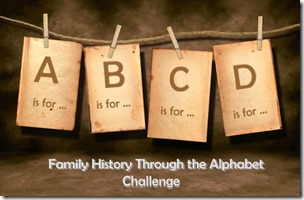
For 26 weeks I will take you on a family history journey through the alphabet, one letter at a time. I have decided that each post will be educational in nature, focusing on topics related to resources, methodology, tools, etc. Although the challenge is complete, there are still some people who are finishing up and Alona, the host, is encouraging others to participate anyway. Additional information on the challenge, can be found at Take the ‘Family History Through the Alphabet’ Challenge.
 K is for Kindness. Several years ago, a wonderful service was created by Bridgett Schneider called Random Acts of Genealogical Kindness (RAOGK). RAOGK was a website that allowed for people to volunteer their genealogy services (mostly in the realm of lookups or cemetery photos) and for researchers to request these services for free (with the exception of reimbursed expenses, such as copy fees). With Bridgett’s passing in November 2011, RAOGK shut down. As of late, no one has heard whether her husband, Doc, will reactivate the site or not.
K is for Kindness. Several years ago, a wonderful service was created by Bridgett Schneider called Random Acts of Genealogical Kindness (RAOGK). RAOGK was a website that allowed for people to volunteer their genealogy services (mostly in the realm of lookups or cemetery photos) and for researchers to request these services for free (with the exception of reimbursed expenses, such as copy fees). With Bridgett’s passing in November 2011, RAOGK shut down. As of late, no one has heard whether her husband, Doc, will reactivate the site or not.
I participated in RAOGK as a volunteer for a few years, mainly doing obituary lookups in my local area. I also used RAOGK to request a few obituaries for my own research. As a volunteer, I found most people who requested my services were genuinely thankful for the help. I never requested reimbursements simply because I did everything digitally and my library had the capability to save digital images from microfilm. On the rare occasion that the computer/microfilm reader was down, I paid the copy fee out-of-pocket, scanned the printout, and emailed it to the person.
From the requester side of things, it was hit or miss. Some volunteers were quick to respond, even if they couldn’t get my request filled right away, at least the contacted me to let me know they’d received the request and when to expect it. One person wanted me to reimburse him the $0.40 for the copies of two obits. Seriously? Nowhere in his service description did he note that he required reimbursements, so I emailed him back with that grievance and stated that I was also a volunteer and considered copy costs of that amount negligible. So he was kind enough to waive the reimbursement and promptly sent my obits. In one instance, I never received a response at all; no acknowledgement, no fulfillment, and no response to two of my follow-ups. Oh well, there’s at least one in every bunch, right?
At the time of Bridgett’s passing, I was in need of updating my services on RAOGK because I had recently moved and was now too far to conduct research in the area I was listed under. But because the site was down, I was unable to do this. Hoping that RAOGK would be relaunched, I patiently waited. Whether it will ever come back is unknown, so in the meantime, I have been thinking about joining a few alternatives that have since been created.
There are three websites that I know of (not including Facebook groups) that I have briefly looked at.
They pretty much operate the same way as RAOGK in concept: volunteers at the ready to fulfill lookup requests for free (excepting reimbursements). I haven’t quite decided if I am going to sign up with any of them yet. The Wiki is very awkward to use. Generous Genealogists takes some getting used to, but also offers forums and “Brick Wall Detectives” for more ways to get help with your genealogy. Gen Gathering seems to be the closest to the original RAOGK. Decisions, decisions.
Your Turn
Have you joined any of the three website listed above? What has your experience been? Do you know of other similar websites (not Facebook or Google groups)? Please share your thoughts in the comments of this post.

Julie, while I had read about Bridgett’s passing and the end of RAOGK, somehow I think–at least in my own mind, if not in reality–that the term “Random Acts of Genealogical Kindness” had somehow morphed into a staple of the genealogist’s lexicon. It’s become a descriptor of what we do for each other, when the time comes and when the need arises. Though there may not be one specific website still bearing that title, I see that selfless little act repeated, over and over again, in all the genealogy forums, on Facebook sites, through Twitter, and even in the non-virtual (real) world at libraries. I think Bridgett’s idea has paved the way, encouraged us to adopt the mindset, and “go and do likewise.” It’s become a meme. While I do miss her old web set-up, I think I see it multiplied through the many ways genealogists volunteer, “What can I do to help you?” — remembering how each of us has only gotten where we are in our own research through the generous help of others, too!
That is an excellent point, Jacqi! The genealogical community is a pretty giving community, willing to help other when they can. Whether it’s to pull a record, answer a question, or provide advice. I’ve seen a lot of this through my blog and Facebook. A few years ago, when I started blogging, I blogged about my Webster and Parks family in Oakland Co., Michigan. I had three different people in the area offer to help. One took cemetery photos and another made copies of relevant items in several books at the society–I didn’t even ask, they just went out and did it–amazing! I also find that Facebook is helpful for asking my network of genealogy friends questions related to records or location I am not familiar with. I used to get great responses, but now, with the way that FB decides for you what you see, I think a lot of people aren’t actually seeing these questions. I guess I need to start using the groups/pages more for this type of thing.
I’ve been looking at Facebook, too, Julie–the pages or groups format. I think there are pluses and minuses to each format…I can’t manage to keep them straight in my mind, though.
I like the format “Chicago Genealogy” uses on Facebook. Whatever they are doing seems to provide almost instantaneous results. It’s probably all in how you go about building your community, but the tools used can make a difference of its own.
Nice post Julie. Other sites that provide free ‘Genealogical Kindness’ that might be helpful to people are: “Books We Own”, “Genea Search”, and the Library of Congress’ “Ask A Librarian”.